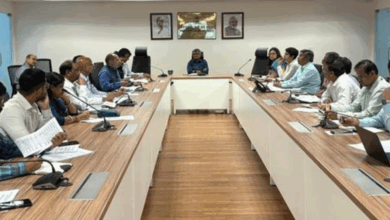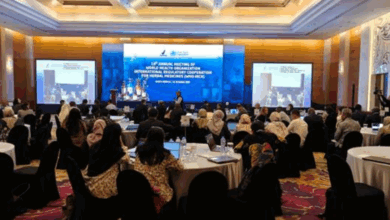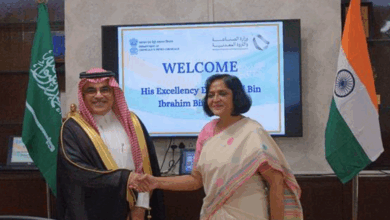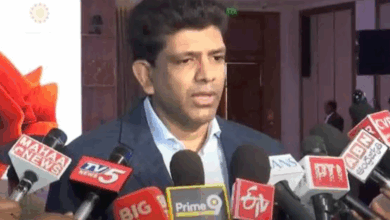Government, civil society and the people at large must work together to stamp out corruption from India: Vice President
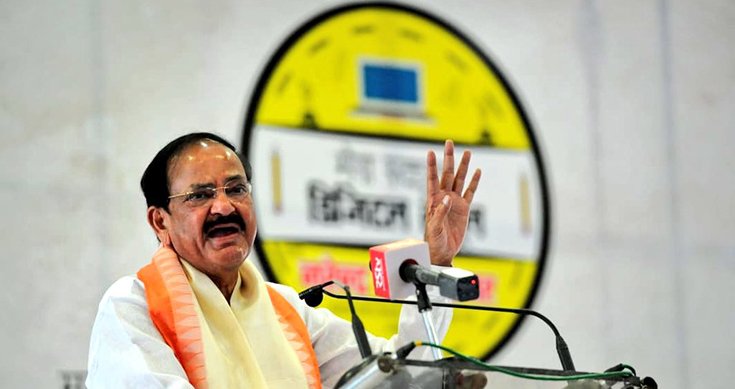
Asks citizens to constantly strive to uphold the sanctity of the constitution
Says accountability, transparency & good governance essential for democracy
Unveils the statue of Babasaheb Dr. B R Ambedkar at premises of office of the Comptroller and Auditor General (CAG)
The Vice President today termed corruption as the major malaise affecting the growth and development of the country and called upon the government, civil society and the people at large to work together to stamp out the menace of corruption from the nation. He was addressing the gathering after unveiling the statue of Babasaheb Dr B R Ambedkar at premises of office of the Comptroller and Auditor General (CAG) in New Delhi today.
Recalling the words of former President, A P J Abdul Kalam, Shri Naidu emphasized that teachers, apart from parents, play an important role in shaping students’ characters and building a value-based society.
Paying rich tributes to Dr Ambedkar, the Vice President said that he was a multi-faceted genius—a visionary statesman, philosopher, towering intellectual, eminent jurist, economist, writer, social reformer and a humanist par excellence.
Observing that India had one of the most robust Constitutions in the world, Shri Naidu lauded the stellar contribution made by Dr Ambedkar in drafting the Constitution and the pioneering role he played in guiding the nation at a critical juncture.
The Vice President said that to this day, our constitution remains a sacred book and a guiding beacon on all matters and asked every citizen of the country to strive to ensure that the sanctity of our Constitution is upheld at all times and never violated.
Observing that Dr Ambedkar was the messiah of the oppressed, the Vice President said that all through his life, he strongly believed in gender equality and emancipation of women through education and strove to dismantle the caste barriers and ensure equality for all people.
“The purpose of installing his statue is to remind us the ideals of this great man and to see that present and future generations remember his teachings which are guiding principles for everyone of us”, he said.
Applauding the CAG for being a strong and credible institution, the Vice President credited the framers of our Constitution, particularly Dr Ambedkar for ensuring independence and wide mandate to the CAG. He added that the core values of the CAG—independence, objectivity, integrity, reliability, professional excellence, transparency and positive approach—drew inspiration from the life and work of Dr Ambedkar. He called accountability, transparency & good governance as very essential for the democracy.
The Vice President credited the reports of the CAG and the consequent deliberations in the committees of the legislatures for having led to various changes in the regulatory framework, governance structures and delivery mechanism of the government, ensuring economy, efficiency and effectiveness of government operations.
Shri Naidu also complimented the CAG for acquiring an excellent reputation amongst the international community of Supreme Audit Institutions (SAI) and for its endeavour to become a fully paperless office by 2022.
Earlier, the Comptroller & Auditor General, Mr. Rajiv Mehrishi welcomed the gathering and the Deputy CAG, Ms. Anita Pattanayak proposed words of thanks.
Following is the full text of the speech –
- I am extremely delighted to be amidst all of you to unveil the statue of Babasaheb Dr B R Ambedkar, the architect of the Indian Constitution and one of the builders of modern India. Dr. Ambedkar was a multi-faceted genius—a visionary statesman, philosopher, towering intellectual, eminent jurist, economist, writer, social reformer and a humanist par excellence. The nation will be ever grateful to the iconic leader for his stellar contribution in drafting the Constitution and for his pioneering role in guiding the nation at a critical juncture. Today, we have one of the most robust Constitutions in the world which was amended from time to time in accordance with the needs of the time.
Dr. Ambedkar was a man of many parts with interests and skill in several fields. His eclecticism is reflected in his books such as ‘Problems of the Rupee: its origin and its solution and ‘Evolution of provincial finance in British India’ and show his command over economics and finance. Similarly, his books ‘Castes in India: their mechanism, genesis and development’ and ‘The Annihilation of Caste’ reflect his deep understanding of Indian sociological realities.
Dr. Ambedkar left an indelible imprint on the sands of time and his thoughts are relevant for all times. Indeed, he was the messiah of the oppressed and all through his life, he strove to dismantle the caste barriers and ensure equality for all people. He strongly believed in gender equality and emancipation of women through education. He famously said: : “Political democracy cannot last unless there lies at the base of it social democracy. What does social democracy mean? It means a way of life which recognizes liberty, equality and fraternity as the principles of life.”
His vision contributed towards the formulation of water and industrial policies in the country.
Today, we are in the hallowed premises of the CAG, which has been mandated by the Constitution of India to promote accountability, transparency and good governance through high quality auditing and accounting and provide independent assurance to our stakeholders, the Legislature, the Executive and the Public, that public funds are being used efficiently and for the intended purposes.
Although the history of the audit department is almost 160 years old, it was the Constitution of the newly formed independent Republic of India which proved catalytic in transforming this organization of the colonial era into the CAG of India as an independent pillar of Indian Parliamentary democracy.
Today CAG is a strong and credible institution and the credit for this must go to the framers of our Constitution, particularly to Dr Ambedkar, who had the vision to ensure independence and wide mandate to the CAG.
During the deliberations of the of the Drafting Committee of the Constitution, Babasaheb had very famously said ; I am of the opinion that this dignitary or officer is probably the most important officer in the Constitution of India. He is the one man who is going to see that the expenses voted by Parliament are not exceeded, or varied from what has been laid down by Parliament in the Appropriation Act. If this functionary is to carry out the duties—and his duties, I submit, are far more important than the duties even of the Judiciary—he should have been certainly as independent as the Judiciary”.
Babasaheb’s life and work have inspired the entire nation and it is heartening to see that the core values of the CAG—independence, objectivity, integrity, reliability, professional excellence, transparency and positive approach—draw inspiration from his life and work.
Today the CAG has evolved as an enabler to Balasaheb’s vision that not only ensures public financial accountability but also acts as a friend, philosopher and guide of the executive. Many reports of the CAG and the consequent deliberations in the committees of the legislatures have led to various changes in the regulatory framework, governance structures and delivery mechanism of the government, thereby ensuring economy, efficiency and effectiveness of government operations.
Dear Sisters and brothers,
Corruption is a major malaise affecting the growth and development of the country. It must be the endeavor of all the stakeholders—the government, civil society and the people at large—to collectively stamp out this menace. Here, I would like to refresh everyone’s memory by quoting the late President, Shri APJ Abdul Kalam, who had said: “If a country is to be corruption free and become a nation of beautiful minds, I strongly feel there are three key societal members who can make a difference. They are the father, the mother and the teacher”.
Apart from parents, teachers are looked upon as role models by children and they play an important role in shaping students’ characters and building a value-based society. Many years ago, the Father of the Nation, Mahatma Gandhi, had observed: “Education which does not mould character is absolutely worthless”.
While the Constitution reflected the vision of Dr Ambedkar and its framers gave us one of the best living documents, it is for every Indian, be it an ordinary citizen or a person occupying high constitutional post, to ensure that the sanctity of our Constitution is upheld at all times and never violated. Otherwise, it will be tantamount to betraying the trust and faith of the founding fathers.
It will be apt to recall the sagacious words of Dr.Ambedkar, who had said : “However good a constitution may be, if those who are implementing it are not good, it will prove to be bad. However bad a constitution may be, if those implementing it are good, it will prove to be good”.
For all the citizens of India, the Constitution remains a sacred book and a guiding beacon on all matters. We should salute the constitution-framers for their vision and statesmanship in giving us a constitution that laid a strong foundation for our parliamentary democracy and stood the test of times.
Before concluding, let me compliment CAG for acquiring an excellent reputation amongst the international community of Supreme Audit Institutions, known as SAIs. I also appreciate the aim of CAG to become fully paperless office by 2022. I was immensely pleased to know that CAG has started a lecture series named as ‘Dr B R Ambedkar Lecture Series’ where eminent personalities are called upon to deliver lectures on emerging topics.
And now, with the installation of this statue of Babasaheb, I am sure it will go a long way in inspiring and guiding the work of the institution of the CAG of India. May, Babasaheb, as always, be the guiding light!
Thank you. Jai Hind!”



